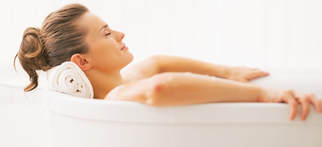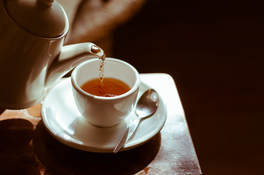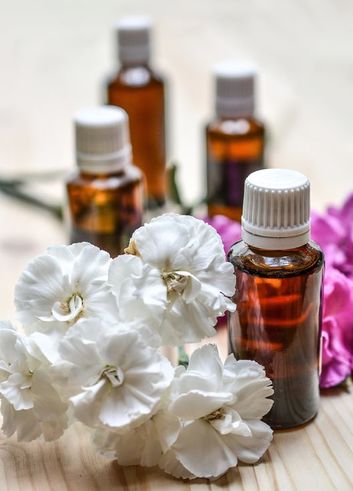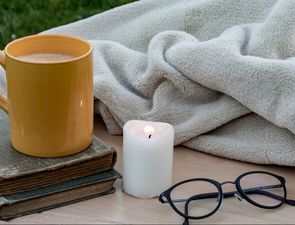Tips for Better Quality Sleep
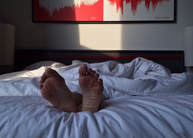
Deep sleep is necessary for our bodies and minds to rest, repair and rejuvenate. In addition to the many health benefits of a good night's sleep, we tend to make better decisions throughout the day when we're well-rested (Think, "Do I want the cookie or the carrots?"). In order to achieve a good night's sleep, it is critical to transition out of our active day and into our parasympathetic nervous system (our "rest & digest" mode) in the evening. Personally, I know that I've achieved a good night's sleep when I wake up naturally (before my alarm goes off) feeling rested, refreshed and excited to start my day. Here are several tips to optimize your sleep.
Have a consistent wake and sleep schedule.
|
Good sleep hygiene includes a consistent routine. Go to bed and wake up at about the same time every day; this helps set your circadian rhythm so that your physical body begins to naturally sync up to your routine. Ayurveda recommends naturally waking with the rising sun and slowing down with the setting sun since it perfectly aligns with nature's own rhythm.
|
Eliminate caffeine and energy drinks at least 8 hours before bed.
|
If you're sensitive to caffeine, stop drinking it at noon. At minimum, stop drinking all caffeinated beverages 8 hours before your bedtime.
Watch out for black tea, green tea and even chocolate - they all contain caffeine. See below for some great alternatives. |
Get outside every day.
|
Sun exposure during the day helps reinforce your natural circadian rhythms. You get bonus points for catching the morning rays. Getting outside in nature also works wonders for your mental health.
|
Move daily but avoid vigorous exercise right before bed.
|
Daily exercise and movement definitely helps sleep. But if you missed your workout, don't try fitting it in right before bed. The adrenaline and cortisol released during exercise (especially if it's vigorous) can keep you up at night, which will only cause yet another surge in cortisol and other stress hormones. Ayurveda recommends avoiding vigorous exercise several hours before bedtime (3 hours works for most people; the "Sleep Doctor" Dr. Michael Breus recommends 4 hours but notes that some people can get away with evening exercise). Your health will be better served with stretching, gentle yoga or even a relaxing walk under the moonlight.
Note: The most optimal time for exercise is in the morning, as it improves blood sugar regulation, boosts parasympathetic activity and has even been shown to lead to better daytime satiety (Dr. John Douillard, 3/10/18, https://lifespa.com/5-reasons-morning-exercise-better-evening-exercise/). |
Get rid of blue light two hours before bed
|
The blue light coming out of your screens (TV, cell phone, laptop, etc.) is very detrimental to a good night's sleep. Blue light reduces melatonin, our sleep hormone. Research shows that night-time exposure to blue light makes you more alert and also affects your circadian timing.
There are several ways to eliminate or, at least reduce, blue light in the evenings.
|
Avoid big meals right before bed.
|
Avoid eating a heavy meal near bedtime. Too much food before bed can cause you to feel physically uncomfortable and even cause heartburn and acid reflux. Your body has to expend energy to digest food, which can interfere with your body's ability to rest. A large meal near bedtime also interferes with your body's ability to repair, which is a major priority during sleep.
Note: While it's best to officially close down your kitchen right after dinner, some individuals benefit from a hot spiced milk before bedtime to promote sleep. |
Be careful with alcohol.
|
It takes time for your body to digest and metabolize alcohol, so drinking too close to bedtime can negatively affect sleep quality and your body's ability to conduct its job of overnight repair and rejuvenation. The "Sleep Doctor" Dr. Michael Breus advises no alcohol consumption 3 hours before bedtime.
|
Take a hot Epsom salt bath or a warm shower in the evening.
|
When I really need to unwind, I like to put 1 cup of Epsom salts and 1 cup of baking soda in a hot bath with 3-5 drops of lavender essential oil and soak for 20+ minutes. Your body will absorb the magnesium from the Epsom salts, which is a muscle relaxant and wonderful stress reliever. The baking soda is also great at relieving tired and achy muscles and joints. If you're not a fan of baths, try dropping a couple drops of lavender essential oil in your shower.
|
Perform abhyanga.
|
Abhyanga (full body self-massage with warm oils) is one of the most nourishing things that you can do for your body. Click here for directions and a video. Performing abhyanga at ANY time of the day will promote a good night's sleep.
If you have serious sleep issues, I highly recommend performing abhyanga DAILY. Try it for a week and see what a difference it makes. |
Sip warm herbal tea or golden milk.
|
Make sure to select a naturally uncaffeinated tea; most herbal teas are perfect. There are lots of sleepytime teas on the market, but my tried and true favorite is a mug of hot chamomile tea, a couple hours after dinner.
If you have a lot of trouble getting a good night's rest, try warm spiced milk. The peptides in dairy milk activate GABA centers in the brain that help us relax. Consumed right before bed, a warm spiced milk is the perfect tonic for a restful sleep. See recipes for Golden Milk here and here. Click here to see my Ayurveda-inspired recipe for warm spiced milk. Plain warm milk also works well. |
Try stretching, yoga nidra, restorative yoga, pranayama, and/or meditation.
|
Perform one of these practices in the evening before bed, or if you wake up in the middle of the night and can't get back to sleep.
|
Use essential oils.
|
There are many essential oils that have been researched for their ability to relax your body and encourage better sleep. Lavender, chamomile, sandalwood, vetiver, bergamot, and cedarwood are just a few. Use these oils right before bedtime for the greatest benefit. Both topical and aromatic applications include:
|
Use your bed for sleeping & sex.
|
Don't use your bed for working, eating, surfing the web, or watching TV. Hopping into bed should be an immediate signal to your body that it's time to relax and rest, so don't confuse your body by using your bed for anything other than sleep and sex.
|
Keep clocks and cell phones out of sight.
|
Don't let yourself get distracted with shining lights or counting the number of minutes that it's taking you to fall back asleep. Angle your clock so that the time is not hitting you head-on. If you must keep your cell phone in your bedroom, lie it face down as far away from you as you can. Checking e-mails and surfing the web are definitely off limit during bedtime hours.
|
Keep your room dark and cool.
|
Eliminate all sources of light in your bedroom. Use blackout curtains (binder clips also work to seal curtains). Don't keep your laptop in your bedroom, unless it is shut down and unplugged. Even the lights from a charging tablet or laptop can interfere with your sleep. At minimum, cover up any technology that must be charged in your bedroom overnight (black tape over LED lights is a quick fix). If you truly can't control your environment, wearing a sleep mask or eye pillow is another option (I like the contoured sleep masks).
|
Follow a bedtime routine.
|
In addition to going to bed at the same time every night, follow a basic bedtime ritual. After a couple weeks, you'll find that your body thrives on this routine and effortlessly begins to relax as you move into your evening. Closing down your day is an important signal to your body that it's time to relax and restore. It's best to avoid anything that is going to ramp you up - intense work, intense conversation, even intense TV. Try incorporating some of the practices that I've mentioned above into your nightly routine: play a board game, listen to music, read an inspiring book, journal, hot Epsom salt bath, warm shower, abhyanga, stretch, pranayama, meditation, yoga nidra, restorative yoga, sip hot spiced milk.
My favorite bedtime ritual? Take a hot Epsom salt bath (with a few drops of lavender essential oil added), floss & brush my teeth, oil pull with coconut oil, read something inspiring, rub some lavender oil on the bottom of my feet then snuggle into bed. Sweet dreams! |
Matthew Walker, author of international bestseller Why We Sleep:
|
|
|


